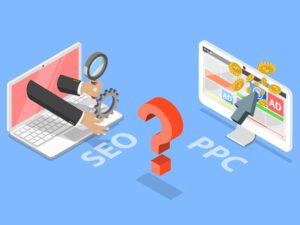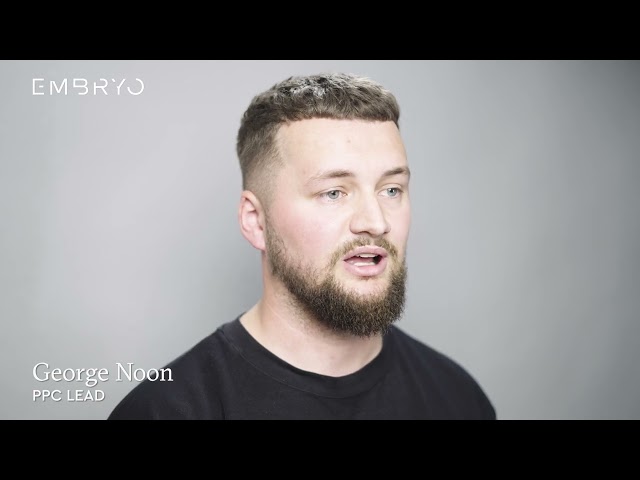SEO and PPC are often integral to any marketing campaign and particularly to those strategies that aim to target the SERPs and generate revenue for online stores. Too often SEO and PPC don’t work together in tandem and they’re pitted against each other with conflicting ideas. However, they should be implemented to compliment one another. After all, they both want similar goals for your business.
The roles of each channel can work for the same business instead of choosing one over the other. New results can even be obtained when opting for both. We’ll tell you why and how you’ll want to integrate SEO & PPC within your marketing– get ready for better results and a holistic approach.
Defining SEO and PPC

SEO aims to optimise your website so it can rank higher in the SERPs. Obtaining the higher ranking works by improving your site for a user’s search query, so it aims to generate organic traffic and maintain long-term improvement as opposed to using quick fixes. The way users search is forever evolving, and SEO has evolved with it with practices like mobile SEO.
Site maintenance can be ensured with technical SEO, and overall visibility is improved with both off-page and on-page techniques. Off-page techniques are the workings that don’t take place on your site (like backlinks) and on-page are practices that optimise the actual page itself (like content).
As for PPC (pay-per-click), advertisers pay every time a user decides to click on their ad. PPC consultants bid for relevant keywords so the ads can appear at the top of the SERPs, in turn driving more traffic to the relevant site. The ad is ideally displayed in relation to the relevant search query so a user looking for your product or service is going to see your ad.
Potential customers are a lot more accessible through PPC, and there’s the added bonus of being able to implement changes to the ads in real-time.
The key differences between SEO and PPC
Quite a few key differences exist between the two practices, and it’s important to get a sense of their contrasting elements in order to have a successful integration process. Here are some of the main ones:
SEO focuses on investing time, PPC uses money
SEO and PPC invest different things into strategy, with SEO investing time and PPC investing money. SEO takes a lot more time to gain impactful results. Your site needs all the correct technical foundations before you even start thinking about content or site structure. Careful maintenance is also required, ensuring everything is running smoothly.
PPC can deliver results a lot faster. Results are also sometimes based on budget and how much you’re willing to bid, therefore having a much more money focused approach in comparison to SEO.
Goals for SEO compared to PPC
The way success is measured can look quite different for the two. Despite some overlap, KPIs may differ in order to accurately measure its impact on your site. For example, SEO may measure success through organic traffic and the visibility of your site.
However, PPC may use ROI (return on investment) as an indicator of success, as well as the general effectiveness of the paid ad. This could involve how much revenue it generates or how many clicks it receives.
SEO and PPC target different areas of the SERP
The SERPs are a very large, detailed platform to try and navigate within your marketing strategy. With many aspects, the SERP features weave a complex tapestry of great knowledge across the search engine landscape. With so much going on, it’s handy that SEO and PPC aim to target different areas.
Organic features are targeted by SEO, whereas PPC improves your ranking for paid results as opposed to organic. They can influence different areas to ensure your site has the best possible chance of ranking highly.
How and why to integrate SEO and PPC
So now you know some key differences between SEO and PPC, you’ll be wanting to know the benefits of implementing both and how they can work together. They can bring out the best in one another, achieving results that aren’t possible when just one is being used. The amount of data both can provide is huge, and it would be beneficial to marry the two sets of data.
By improving your organic ranking with SEO, and then bidding on relevant keywords with PPC, you expand your reach and target multiple ranking opportunities. Additionally, the access to even more data allows an in-depth strategy to be created that targets the ins and outs of user behaviour.
Here are 3 key ways you can combine the two:
| Keyword Strategy | Thoughtful keyword clustering can be implemented through A/B PPC ad testing, seeing which keywords are received best by users. Using this, content can be made around these words and a more detailed keyword strategy can be created. Both reveal information surrounding audience behaviour, including which ad copy is received well and how users actually search for your site. So, high-converting keywords can then be put towards organic search and optimised for ranking. |
| Combine the data | One of the most obvious benefits is what the combined data can do for you (spoiler: it’s a lot!) It’s no secret that a lot of marketeers prioritise data to inform their decisions, so combining the data from both PPC and SEO is a game changer.
Target audience information revealed by PPC can inform how you use SEO. After all, you want as many potential customers and users as possible. Long-form content can be created around PPC data too! The possibilities are endless. You may even use both sets of data to optimise a landing page experience for a user. |
| Maximise overall visibility | Let’s say your SEO strategy has allowed you to soar in the rankings, achieving top position. That’s great! However, all it takes is one effective PPC ad to steal top spot- and there’s nothing you can do about it. Unless…
You decide to add PPC to your strategy! This way, overall visibility can be improved and more ranking opportunities are covered. However, an ad isn’t always effective on its own. A click is just a click, but SEO can help it convert. The key is to find the right balance so the two approaches aren’t stepping on each other’s toes, but so they cover all ground in the organic and paid spaces. |
Choose an agency that can do both
Looking to choose SEO & PPC for your marketing? Embryo can help. Our experience makes us equipped for anything your business may need, approaching strategy with the utmost expertise and detail.
As an agency with incredibly strong teams in both PPC and SEO, we can use our knowledge of both channels to achieve the best possible results for your site. Get in touch with the team to find out more.
FAQs
Answered by Tom McGuigan
Should SEO be optimised before starting PPC?
I think SEO being optimised is obviously essential, but it’s not necessary for it to be optimised before PPC activity begins.
Should my keyword research be targeting different parts of my website for SEO and PPC?
While there will be overlap, it’s important to know that the audiences for SEO and PPC typically differ. SEO may want to focus more on informational keywords and content, whereas PPC is typically more bottom-of-funnel and the keywords being targeted should reflect this for the best results.
What is the best way to coordinate SEO and PPC marketing?
Identify the areas in which gaps need to be filled. If SEO is ranking low for particular search terms, then filling in those gaps with PPC ads may benefit your business. Conversely, if the Avg. CPCs for particular search terms are too high, then increasing your organic rankings in this area may benefit you more. It’s all about working together for the wider business and avoiding a race to the bottom.
What metrics indicate the success of an integrated approach?
This is where metrics such as the Marketing Efficiency Ratio and New Customer Acquisition Cost come into play. Taking a more holistic approach on your total marketing results compared to your total marketing spend will help see if you’re directing performance in the right way.
Do SEO and PPC target different stages in the buyer journey?
Again, there are no absolutes, but typically PPC users will be more bottom of the funnel, whereas SEO will typically bring in users that are further up the funnel.














